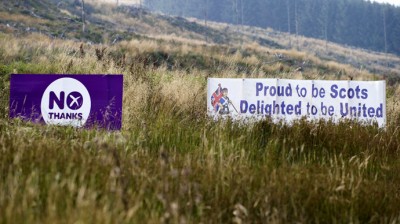Secret US Intelligence Files Reveal “Washington’s Interest” in Scottish Referendum

The Scotland Office tried to impel the White House to step in in the independence referendum, top secret US documents reveal, the Daily Express reports. US officials also allegedly kept an eye on Americans who backed Scottish independence.
The files, which reportedly run to hundreds of pages, indicate that the White House followed the Scottish independence debate from day one, when the SNP first won power in 2007, the report claims.
The Scottish Sunday Express asked the US State Department for any documents relating to the independence referendum in January 2012, using the US Freedom of Information Act. It reportedly took some three years. The Central Foreign Policy division traced 60 documents, 22 of which were released in full, and 19 with some information redacted. A further 14 documents have been “kept secret in the interest of national defense or foreign policy,” and the final five are still being kept under review.
The most striking revelation appeared to be contained within a “sensitive but unclassified briefing,”dated February 15, 2013. It reportedly reveals that the head of Internal Politics at the US Embassy in London, Marisa Plowden, got in touch with an official from the UK government’s Scotland Office to discuss a new Whitehall report on independence.
“Scotland Office contacts stressed that this policy paper, more than some others they will release, has an international dimension,” the briefing states, the Daily Express reported.
“They suggested the US could be asked, by the press, if we would recognize the rest of the UK as a legal successor state. [Political officers] recommend we not alter our talking point that the referendum is a domestic political issue. If pressed, we could say the question of recognition is a hypothetical one, and we don’t engage on hypothetical questions.”
A “sensitive” report from May 14, 2013, reportedly informed Washington about former Labour PM Gordon Brown’s launch of “United with Labour,” the Scottish Labour Party’s campaign for a No vote in the referendum on Scottish independence.
“The launch demonstrates Labour’s difficult position in Scotland as it seeks to distance itself from the unpopular UK Government ahead of 2015 UK elections, while remaining within a pro-Union coalition,”the report says.
Washington was also allegedly informed about prominent American citizens involved in the independence debate, including Nobel Prize winning Professor Joseph Stiglitz, who has been a member of the Scottish Government’s Fiscal Commission Working Group since 2012, and former US Ambassador, Professor of Law David Scheffer.
In February 2014, the then-deputy leader of the Scottish National Party (and now its leader), Nicola Sturgeon, addressed the European Parliament in Brussels.
“Sturgeon appeared as a forceful politician and her presentation impressed even opponents of Scottish independence in the audience, including many Scottish EU officials,” the US observed, according to the document cited by Daily Express.
It adds that “several Member States (led by Spain facing the prospect of secession from Catalonia) could be expected to place serious obstacles in the way to an independent Scotland in the EU.”
Sturgeon’s predecessor as SNP leader and Scottish First Minister, Alex Salmond, was reportedly described in 2008 as “getting top marks for leadership, intelligence, likeability, guile and the breath of fresh air he is said to be injecting into the government.” His anti-war views, however, cast a shadow on US Undersecretary of State Bill Burns’ visit to Edinburgh in December 2007 for NATO talks on Afghanistan, the report says.
“The war in Iraq has never been seen as popular, especially in Scotland, and the Scottish Parliament in 2003 voted against British forces going into Iraq,” the classified briefing paper says.
“The conflict in Afghanistan has more support, but that is also waning. Salmond is firmly against the war, and as both MSP and MP he has been quite vocal in his opposition in both Houses,” the paper says, adding that the fourth First Minister of Scotland was also opposed to the UN-sanctioned actions in Kosovo and Iraq, “so his opposition to Iraq and Afghanistan is not surprising.”

